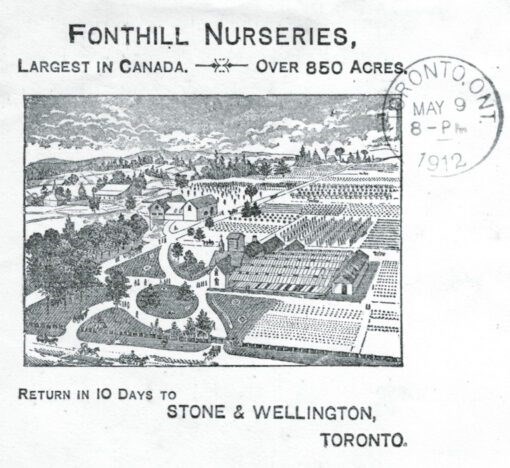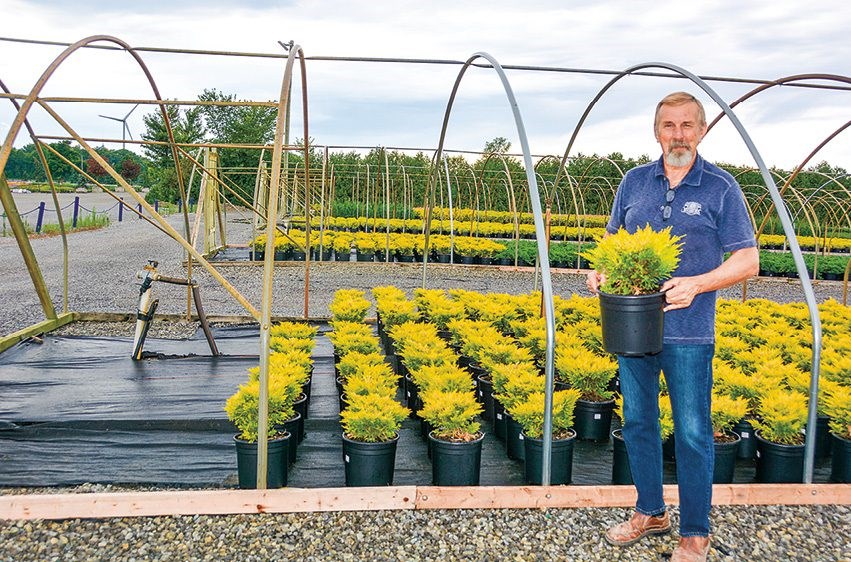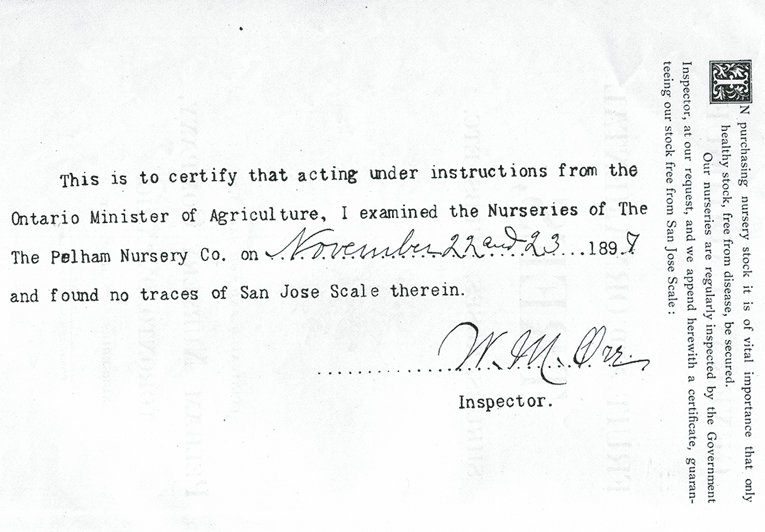Fonthill Nurseries operated for over a century, closing its doors in 1968. Willowbrook still flourishing after nearly 45 years.
Tom Crawford and his wife, June, moved to Foresthill Crescent in Fonthill in late 2004. They were told that their house, built in 1982, was on land that was at one time part of an extensive plot of nurseries. The Crawfords never thought much about it.
“When June died last April, I found newspapers and documents among her files,” said Tom. "One booklet, dated 1937, was entitled ‘One Hundred Years, the Fonthill Nurseries.’ I also found a 1976 corroborating document online, by a Welland Tribune reporter, entitled ‘The Rise and Fall of the Fonthill Nurseries: Once a thriving industry, now just old memories.’ I thought the story might be of interest to folks in Pelham.”
The Tribune reporter, Jim Middleton, noted in his 1976 article that, at its peak, Fonthill Nurseries owned or rented more than 1000 acres of land in Pelham, and provided employment for up to 250 residents of the area. Dozens more across Canada worked as sales agents on behalf of the Fonthill-based business. His article noted that the nurseries were a proud and economically valuable operation for nearly 100 years, and up until the end of World War II provided jobs even in depressed times.

Carolyn Botari, of the Pelham Historical Society, was happy to supply the Voice with a folder crammed with documents that described the agricultural efforts in Pelham reaching back through the centuries.
The roots of the industry in Pelham were planted by Samuel Taylor, who began a 100-acre nursery business in 1837, which was subsequently purchased by the partnership of Dexter D’Everardo and a Mr. Page. The business then passed to Edward Morris, which expanded to a triumvirate of Morris, George Stone, and the Wellington family, with Morris managing the nursery, and the Wellingtons running the retail side through a network of sales agents in the 1870s. A man named Davidson also had a hand in the business.

During the 1930s, Fonthill Nurseries had a catalogue which presented its line of products, including ornamental and shade trees, flowering shrubs, roses and evergreens, fruit trees, small fruits, asparagus and rhubarb plants. The company’s offices were off Pelham Street, near Pancake Lane, and they shipped worldwide.
The last president and managing director of the nurseries was Bill Wellington (the third generation of Wellingtons involved in the business), who pointed to high-volume chain stores selling plants, and the import of cheaper plants coming from the Netherlands, as key reasons for the company’s demise in 1968. The final straw was when the Township of Pelham ran a water service line along a major portion of the company’s land, which raised the nursery’s taxes out of the agricultural bracket.
The Woodstream Estates subdivision now occupies much of the former Fonthill Nurseries site.

Ever wonder about how Pancake Lane got its name?
According to Mr. Wellington, the name derives from pancake-shaped cattle droppings which baked in the summer sun while animals grazed in the area. Others attribute the lane’s name to a hurricane which hit the area in the 1700s, knocking it “flatter than a pancake.”
Not much more than a decade after the closure of Fonthill Nurseries, John Langendoen established Willowbrook Nurseries, on Victoria Avenue.
“Fonthill Nurseries was the hub of the nursery industry in Canada for many years,” said Langendoen, who has been in business since 1979, when he rented 30 acres of land and built his first hoop-style greenhouse. Two years later, he bought ten acres on Balfour Street, and in 1982 hired his first employee, Rob Bouwers, who is still with Willowbrook, leading the sales team.
Langendoen said that his operation is one of three high-volume nursery businesses in Pelham, plus a few smaller players like Vermeer’s and Rice Road Nurseries.
“We ship to all of eastern Canada, from Ontario and Quebec through to the Maritimes and Newfoundland, plus the Eastern US and the Midwest. We sell to big-box stores and Canadian Tire, everything from small flowering plants to trees,” he said.

Willowbrook is a heavily mechanized and automated operation with greenhouses aplenty, unlike the growers at Fonthill Nurseries back in the day, who offered only field-grown plants and trees, dug by hand, and using horse-drawn equipment when required. Langendoen said that his is a container-grown operation, with all shrubs, perennials, and evergreens in plastic pots. He has 350 acres of land in total, with about 220 in full production, and another 50 acres being developed for future agricultural use.
With a staff of about 220 at peak season, half are offshore workers, coming primarily from Mexico. The other half are local full time or seasonal staff, reduced to about 80 in the winter.
“Most of the Mexicans are country boys, who have grown up knowing hard work and manual labour. They're not from the cities,” said Langendoen.
The Willowbrook nursery operation has proven to be profitable, especially in the years of Covid.

“The past two years of Covid actually were a bonus for us, with people staying home and enhancing their properties with landscaping,” said Langendoen. “We sold out—2022 is a bit of a correction year, but still a good year for us. We’re an aggressive operation, always on the cutting edge of new varieties, with newer version of plants that have fancy foliage and are very hardy.”
Langendoen has horticulture connections with both the Vineland Research and Innovation Centre (an independent organization funded in part by the Canadian Agricultural Partnership, a five-year federal-provincial-territorial initiative) and the University of Guelph’s School of Agriculture. He has Zoom calls regularly with researchers who provide updates on problem insects and other biological threats to his plants.
“We have a new bug here in Ontario called Box Tree Moth, which affects boxwood trees. The Spotted Laternfly is real danger for our industry, primarily for fruit trees and ornamentals, as well as grape vineyards. Emerald Ash borers and Asian Longhorn Beetles are other invasive species, that got into Canada in wooden pallets shipped from foreign countries by ship or aircraft,” said Langendoen, who performs maintenance spraying of pesticides to keep the threat at bay.
One of his biggest challenges relates to staffing, noting that he can't find enough qualified managers to run jobs in the nursery.
Langendoen, whose son Chris, and two of Chris’ kids, works in the business as well, is heavily dependent on his offshore workers.
“Some of our Mexican guys have been coming back for more than 20 years, living in on-site housing,” he said. “They are up at 6 AM, and often work until 7 PM. Some of them don’t have much English when they arrive, but after a few years, they're fluent, and provide mentoring for the new guys. And I and my local workers improve our Spanish proficiency as time passes as well. Our Mexican workers are great guys. We couldn’t be in business without them. Impossible.”

Langendoen bemoans the loss of young, local workers.
“When I was just getting going in the late 1970s and early 1980s, I built the hoop houses and everything myself, with students hired to help out,” he said. “Students back then were the backbone of our business. That was a generation of teenagers with a strong work ethic. And that seems to be gone. Today’s teens don’t want to get up at 6 AM, or get dirty, or wet, or cold. We noticed it especially around the year 2000. We used to have over 100 kids working in the nursery in the summer months, and their numbers dwindled dramatically.”
The offshore workers are well-treated, said Langendoen, and their living quarters receive rigorous government inspections annually.
“The news media has reported on some problems with the treatment of foreign workers in the province, but by and large, growers and farmers know that a happy employee is going to be a good worker,” he said. “We’ve even taken busloads of our guys to Canal Days in Port Colborne, and jetboating on the Niagara River.”
All of the imported labour living on Willowbrook property involves solo males. No husband and wife teams.
“We had women working here in the past. It was problematic,” said Langendoen. “So the current policy here is guys only. But that could change down the road. We do have small work crews of skilled Vietnamese women who come in during the spring to do propagation in the greenhouses, which involves a great deal of manual dexterity. It’s precision work.”